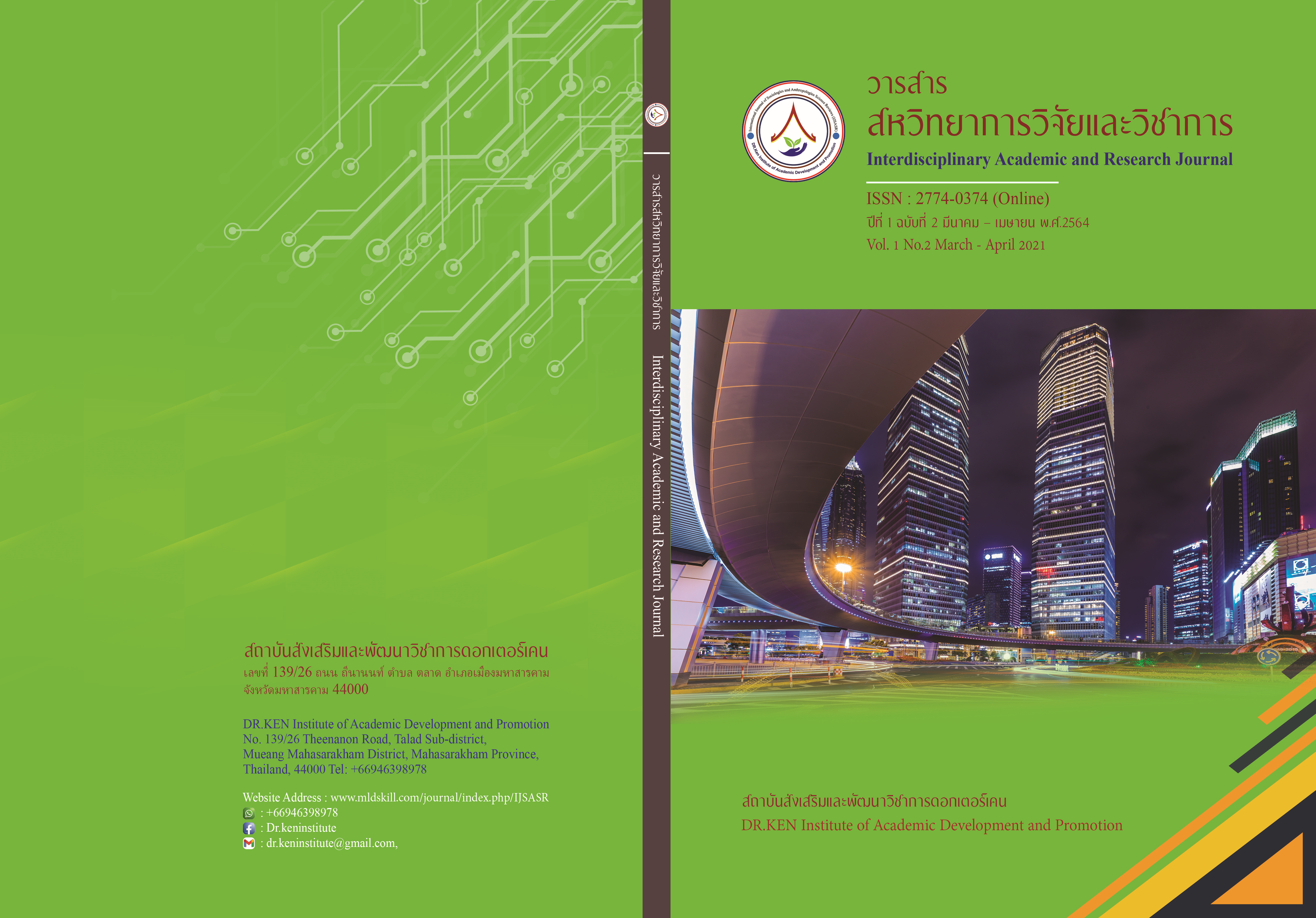A Program Enhancing the Authentic Leadership Effected The Administration of Private Schools
DOI:
https://doi.org/10.14456/iarj.2021.7Keywords:
Reinforcement Program, Authentic Leadership, Private School AdministrationAbstract
The purposes of this research include 1) Study the components and indicators of authentic leadership on management effectiveness of private school administers, 2) Study the current conditions, desirable condition and Modified Priority Needs Index authentic leadership on management effectiveness of private school administers, 3) Develop a program to enhance authentic leadership on management effectiveness of private school administers, and 4) Study the effectiveness of the developed a program to enhance authentic leadership on management effectiveness of private school administers, from a target group consist of 340 people, including private school administrators. The tools include questionnaires, interview forms, tests, and assessments form. The statistics that used for data analysis were percentage, average value, standard deviation and t-test. The research results are as follows
1. The components and indicators of authentic leadership on management effectiveness of private school administers. There are 4 components with 21 indicators, which are: 1) Self-awareness with 7 indicators 2) Balanced processing with 4 indicators 3) Relational transparency with 6 indicators 4) Internalized moral perspective with 4 indicators are all confirmed by experts in general at “The highest” level.
2. The Current condition of authentic leadership on management effectiveness of private school administers administrators, the overall was in the “Medium” level. The desirable condition, the authentic leadership on management effectiveness of private school administers was in “The highest” level. The Modified Priority Needs Index are similar when arranging priority were Internalized moral perspective, Self-awareness, Relative transparency, and balanced processing respectively.
3. The program to enhance authentic leadership on management effectiveness of private school administers components include 1) principles 2) objectives 3) development models and methods 4) content 5) structure 6) learning management in the program and 7) evaluation. The program consisting of 5 learning units, namely that module 1 Attitude and Ethics (Internalized moral perspective), Module 2 Self-awareness (Self-Awareness), Module 3 Bound mind (Relational Engagement transparency), module 4, reasonability (Balanced processing) and module 5 the effectiveness of private school administration total 150 hours. Program evaluation result shows the suitable, the possibilities and benefits were in “The highest” level.
References
นิรันดร์ เนตรภักดี. (2555). โมเดลสมการโครงสร้างภาวะผู้นำอย่างแท้จริงของผู้บริหารสถานศึกษา สังกัดกรมส่งเสริมการปกครองท้องถิ่น. วิทยานิพนธ์ปริญญาปรัชญาดุษฎีบัณฑิต : มหาวิทยาลัยขอนแก่น.
Avolio, B. J., & Bass, B. M. (2004). Multifactor Leadership Questionnaire. Manual and Sampler Set (3rd ed.). Redwood City, CA Mindgarden.
Avolio, B. J., & Gardner, W. L. (2005). Authentic leadership development: Getting to the root of positive forms of leadership. The Leadership Quarterly, 16 (3), 315–338.
Bill George (2003). Authentic leadership: Rediscovering the secrets to creating lasting value. John Wiley & Sons.
Clapp-Smith, R., Vogelgesang, G. R., & Avey, J. B. (2009). Authentic leadership and positive psychological capital: The mediating role of trust at the group level of analysis. Journal of Leadership & Organizational Studies, 15 (3), 227–240.
Cummings, Thomas, & Worley, Christopher (2009). Organization Development and Change, (9th ed). South-Western College Pub.
Duignan, P.A. (2020), "References", Leading Educational Systems and Schools in Times of Disruption and Exponential Change: A Call for Courage, Commitment and Collaboration, Emerald Publishing Limited, Bingley.
Fullan, M. (2001). Leading in a culture of change. San Francisco: Jossey-Bass.
Ilies, R., Morgeson, F. P., & Nahrgang, J. D. (2005). Authentic leadership and eudaemonic well-being: Understanding leader-follower outcomes.The Leadership Quarterly, 16 (3), 373-394.
Manoprom, K. (2019). The Guidelines of Authentic Leadership Development for Administrators in Basic Education Schools. Journal of Humanities and Social Sciences University of Phayao, 7(1), 13 – 31.
Northouse, P. G. (2010). Leadership: theory and practice. (5th ed). Thousand Oaks: Sage Publications.
Tebbit, B.V. (1993). “Demystify Organization Empowerment.” Journal of Nursing Administration. 23, 18-23.
Toor, S.-u.-R., & Ofori, G. (2009). Ethical leadership: Examining the relationships with full range leadership model, employee outcomes, and organizational culture. Journal of Business Ethics, 90 (4), 533–547.
Walumbwa, F., Avolio, B., Gardner, W., Wernsing, T., & Peterson, S. (2008). Authentic leadership: development and validation of a theory-based measure. Journal of Management, 34, 89–126.
Walumbwa, Fred O., Fred Luthans, James B. Avey, & Adegoke Oke. 2011. Authentically Leading Groups: The Mediating Role of Collective Psychological Capital and Trust. Journal of Organizational Behavior. 32 (1), 4-24.
Wong, C. A., & Cummings, G. G. (2009). The influence of authentic leadership behaviors on trust and work outcomes of health care staff. Journal of Leadership Studies, 3 (2), 6-23.
Downloads
Published
How to Cite
Issue
Section
License
Copyright (c) 2021 Interdisciplinary Academic and Research Journal ISSN 2774-0373 (Online)

This work is licensed under a Creative Commons Attribution-NonCommercial-NoDerivatives 4.0 International License.
Copyright on any article in the Interdisciplinary Academic and Research Journal is retained by the author(s) under the under the Creative Commons Attribution-NonCommercial-NoDerivatives 4.0 International License. Permission to use text, content, images, etc. of publication. Any user to read, download, copy, distribute, print, search, or link to the full texts of articles, crawl them for indexing, pass them as data to software, or use them for any other lawful purpose. But do not use it for commercial use or with the intent to benefit any business.
















.png)


